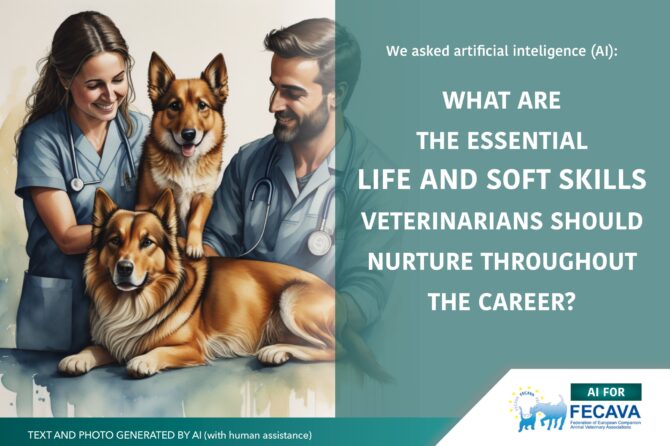
AI for FECAVA: What Essential Life and Soft Skills Veterinary Clinicians Should Nurture Throughout the Career?
As a veterinarian, it is important to possess a range of life / soft skills in addition to technical knowledge and clinical expertise. These skills are essential for effective communication and building relationships with clients, colleagues, and other stakeholders. Here are some key soft / life skills that veterinarians should train in:
- Communication: Strong communication skills are vital for effectively conveying information to clients, discussing treatment options, and explaining complex medical concepts clearly and understandably. Good listening skills are equally important for understanding clients’ concerns and addressing their questions.
- Empathy and Compassion: Veterinarians often work with clients who are emotionally attached to their pets. Demonstrating empathy and compassion helps to provide emotional support during difficult situations and enhances the client-veterinarian relationship.
- Interpersonal Skills: Developing strong interpersonal skills allows veterinarians to work collaboratively with colleagues, veterinary technicians, and support staff. Effective teamwork and collaboration are crucial in a veterinary practice, as they contribute to a positive work environment and ensure efficient patient care.
- Problem-Solving and Critical Thinking: Veterinarians must be skilled at analyzing complex medical cases, making informed decisions, and solving problems. Critical thinking skills enable them to evaluate multiple factors, consider different treatment options, and arrive at the most appropriate course of action.
- Time Management: The ability to prioritize tasks, manage appointments, and handle emergencies efficiently is important in a busy veterinary practice. Effective time management skills allow veterinarians to provide quality care while meeting deadlines and maintaining a work-life balance.
- Leadership Skills: Even if not in a formal leadership role, veterinarians often find themselves in positions where leadership skills are valuable. Effective leadership involves inspiring and motivating others, delegating tasks, making decisions, and fostering a positive work culture.
- Adaptability and Resilience: The veterinary field can present unexpected challenges and is constantly evolving, and being adaptable and resilient is crucial for handling stressful situations, managing change, and maintaining a positive attitude. Veterinarians should embrace change, adapt to new technologies, techniques, and research, and be open to new approaches to patient care.
- Client Relationship Management: Veterinarians should focus on developing strong client relationships based on trust, empathy, and effective communication. Skills such as active listening, clear and compassionate communication, and addressing client concerns contribute to client satisfaction and loyalty.
- Ethical Decision-Making: Veterinary professionals encounter ethical dilemmas throughout their careers. Developing the ability to navigate these situations by considering ethical principles, analyzing different perspectives, and making well-informed decisions is vital.
- Effective Networking: Building a strong professional network benefits veterinarians. Developing networking skills, such as effective communication, relationship-building, and maintaining professional connections, can open doors to new opportunities, collaborations, and mentorship.
- Continuous Learning: Veterinarians should commit to lifelong learning. Staying up-to-date with the latest advancements in veterinary medicine, attending conferences, engaging in continuing education, and actively seeking new knowledge and skills are essential for providing the best care to patients.
- Professionalism: Demonstrating professionalism through ethical conduct, maintaining confidentiality, and adhering to veterinary industry standards is critical for establishing trust and credibility with clients and colleagues.
Remember that these life skills are not innate but can be developed and honed through practice, training, and experience. By actively working on these skills, veterinarians can enhance their effectiveness in providing exceptional veterinary care and improving client satisfaction.
Leave a reply

I appreciate this article for the well-researched content and excellent wording. I got so interested in this material that I couldn’t stop reading. Your blog is really impressive.
ReplyIf you are searching for nursing papers examples, then I would like to suggest you to visit the site at the link. The site will provide you with a variety of academic essay examples that have been written by professionals to help students. By visiting the site, you will be able to find many excellent examples that will help you start writing high-quality essays. Start writing your essay based on an example from an experienced writer.
Replyreally cool like it!
ReplyFor a very long time I suffered from problems with the reproductive system and I was helped here – https://valhallavitality.com/blog/understanding-the-function-of-igf-1-lr3 , finally found a place where I was helped with my problem from which I suffered for a long time, to be cured you need to contact the pros from this site where you will definitely be helped and where you will again become a successful healthy man with women!
ReplyI’ve struggled with migraines for years, and it can be overwhelming trying to figure out what triggers them. I recently came across some interesting insights about how blood tests can play a crucial role in identifying migraine triggers. Understanding these triggers can help me make better lifestyle choices and avoid unnecessary pain. If you’re looking for solutions, I recommend checking out this informative article: https://ways2well.com/blog/how-blood-tests-can-help-identify-migraine-triggers. It really opened my eyes to new possibilities in managing my condition.
Reply